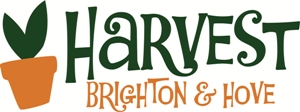Harvest Brighton and Hove
Would you like to see more balconies, gardens and green spaces used for growing food?
So would we!
From window boxes to community allotments, there are opportunities for everyone to join in.
The Harvest project launched in Brighton & Hove in September 2009. It aims to help more people in the city grow their own and eat local food, by helping people gain skills and finding more land for food growing.
Harvest wants to make the benefits of food growing available to everyone - including better access to healthy food, being active outdoors, meeting new people and gaining skills.
Land for growing
There are thousands of people on allotment waiting lists around the country, and finding land for food growing often means competing with other interests such as housing, businesses or parks.
Harvest is working with partners including the city council to open up new allotment plots around the city and to ensure more empty land is used for food growing.
More than 150 new allotment plots have been created so far. Many of these were previously voided/unused plots, while some are existing plots which have been divided in two.
14 plots were also created by a nature reserve by making them 'organic only' to protect local wildlife.
A template lease has also been drafted which allows the council's housing department to lend unused land on estates to community groups and council tenants.
Other landowners are getting involved as well - the rail company has given permission for a group of local residents to grow edible and ornamental plants at a local train station and various private housing associations are interested in helping their residents set up growing projects too.
The council also gave permission for Harvest to set up a demonstration vegetable garden in Preston Park, one of the city's main public parks.
The garden is next to a popular family cafe and is maintained with the help of local volunteers. There have been no issues with vandalism, despite some people's expectations, and the garden's success has inspired many local people to try growing food in their own gardens.
Harvest also includes a local project (similar to the national Landshare initiative) called Grow Your Neighbour's Own. More than 150 people have signed up to the scheme which matches would-be growers with their neighbours' unused gardens and helps them share the results.
Growing communities
Harvest wants to see more community food projects where people can grow, cook and eat together. Many of the new allotment plots in the city have been leased to community groups as this allows more people to access the land and reap the benefits of food growing.
There are currently more than 60 community food projects in the city and a third of these have started since the Harvest project began.
Harvest provides support to new and existing food projects on issues like funding and land, or arranges for experienced gardeners to give growing advice. The project also awards small grants for growing, healthy-eating and cookery projects.
Home-grown Veg
There are regular volunteer workdays at many of the community food projects in the city which are ideal for people who don't have their own gardens or who just want to learn about growing and share in the harvest. The Harvest project also runs a programme of training courses for people keen to grow their own food, no matter what size their space.
Eat Local
For those who don't grow their own, buying local food is a great way to eat healthily, try new food and support local farmers and businesses. Harvest maintains a list of local food shops, farmers markets and veg box schemes. Lots of seasonal recipes are listed on the website and the project runs courses on seasonal cookery, jam and chutney making and more.
Reducing Waste
Harvest includes a scheme for allotment holders to donate surplus produce to local hostels, lunch clubs and community groups. There is also a 'Scrumping Project' which picks fruit from unharvested trees around the city and turns it into juices and preserves. The project also runs training courses on composting and wormeries.
Want to try this in your neighbourhood?
Brighton & Hove was able to develop the successful Harvest project in part because the city already had a non-profit group called the Food Partnership which leads on all food work in the city, including food growing, community nutrition, cookery, reducing food waste and campaigning on food policy.
That said, the core reason for the Food Partnership's success is in its name - it's all about working in partnership!
Food growing can have benefits for all different groups in your community - including the local council, health service, local food businesses, schools, universities and community members.
For example, allowing food growing projects to start on public land may actually decrease the council's maintenance costs while improving food access, diet, cohesion and community spirit.
Whatever type of food project you've got in mind, think about who could benefit and get them involved.
National groups like Sustain or your local council for voluntary service can offer support and advice to groups interested in developing a food project, and the Harvest team are always happy to share their experiences too. Happy growing!
For more information on any of these projects, please visit: www.harvest-bh.org.uk
Brighton & Hove Food Partnership
Emmaus Manor Offices
Drove Road
Portslade, BN41 2PA
01273 431 700
Harvest Brighton and Hove is a three-year, Big Lottery-funded project led by the Brighton and Hove Food Partnership, in partnership with Food Matters, the University of Brighton, The Brighton and Hove Allotment Federation, the Brighton Permaculture Association, Moulsecoomb Forest Garden, Fork & Dig It and the Whitehawk Community Food Project. It is supported by Brighton and Hove City Council and NHS Brighton & Hove.
